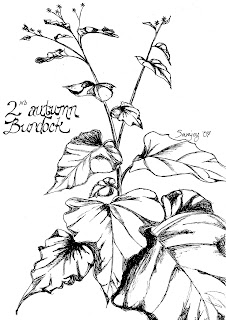The story begins in the dark winter when one European immigrant bur inconspicuously settles in receptive soil.
In April (Latin: Aprilis, meaning “open,” wide open), Burdock (Latin: Arctium lappa, meaning bear-seizer) lumbered awake. Without a manual or self-help book, Burdock’s root found its place in the soil and his leaves began their odyssey toward the sun. At this time, Wild-Eater noticed the unexpected visitor in her yard. She felt the thick leaves, rich with nutrition.
All summer, opulence crept into alleys, parks, creek beds and the Burdock. With abandon, Burdock offered its leaves to the sun and root to the earth. As the leaves unfurled in gratitude, the sun found a growing welcome for its energy. The cycle of gratitude and attraction fed itself. Wild-Eater inspected Burdock again. She noted his leaves, extravagant like Rhubarb’s. The layered, 1’ by 2’ (or smaller), immense heart-shaped leaves with woolly undersides were like jumbo Valentines. Thick, short stems grew from one place in the ground.
One Autumn day, Burdock said, “A good season deserves a good rest.” And with that he began to curl his sleepy leaves in.
Wild-Eater thought about using a pitch fork to dig, dig, dig up the massive white, fleshy root as intact as she could. Instead, she precisely noted Burdock’s location.
Burdock slept serenely that winter without worry. He knew his root, filled with iron, thiamine, magnesium, zinc, Vitamin A, calcium, and protein, was strong. In spring there would be energy enough to start his leaves again (Healing Wise by Susun S. Weed).
The older, wiser Burdock gracefully uncurled his leaves from a confident rosette that second spring. The Wild-Eater came again. Being 100% certain that she had identified the right plant, she took several new leaves and boiled them as greens. People have also used them in poultices: mash, dip in hot water, place leaves on burns, sores and eczema.
Wild-Eater entertained a debate about abundance vs. too much of a good thing. She foresaw the six foot tall giant with Velcro-inspiring burs dropping into her husband’s dreadlocks. Wild-Eater decided to harvest the second-year Burdock. It would die in the fall anyway, root rotting, a meal for worms and beetles only.
If Wild-Eater had been ancient Nez Perce, if her faith in the earth to provide was great as a Nez Perce’s, if she believed, as they did, that giving away remaining food stores awakened the abundance that lies in the earth, sleeping and dreaming of giving itself away, she would have given a First Roots Festival (Lecture 3/13/06 by Joy Mastroguiseppe of UI). But the Wild-Eater did not yet understand the laws of nature, abundance, gratitude, faith and attraction.
Without festival, she shoveled into her wet April yard, a wide, deep, unattractive hole. Perhaps a post-hole digger or pitchfork would be a better idea. Sweaty and tired, she finally just chopped off what exposed root there was.
Wild-Eater washed the thick root then boiled it for twenty minutes, changed the water, and boiled it for 5 more minutes, perhaps unnecessarily. She chopped and fried it with other veggies and it tasted buttery, like artichoke hearts. She might have added it to soup. She read of shredding and frying it like hash browns or roasting and grinding it like coffee. She would never feed them to pregnant ladies or diabetics.
What Wild-Eater had not foreseen that April day was her sadness the next April at finding no conveniently located Burdock. She would have to go down to the creek or borrow someone else’s Burdock now. She might collect seedy burs next autumn to plant.
If Wild-Eater now contemplates planting Burdock next year, it might just be true that you reap what you sow. Perhaps Burdock has knit himself into the fiber of Wild-Eater’s being, like a bur, and is still unleashing lessons of generosity and gratitude upon her. Perhaps he is waiting, within her, to unfurl his leaves of faith, thanksgiving and plenty, waiting for his place within her garden. Perhaps she will try First-Roots-Festival faith, and perhaps she will try gratitude for roots and burs alike.
skip to main |
skip to sidebar
everything nature intended
Blog Archive
Weedies: the breakfast of champions
Chronicled here are the wild edibles of the Inland Northwest. These articles were originally written and published in the Moscow Food Co-op Newsletter. My wild vignettes are arranged monthly for easy digestion and seasonal availability. Peruse, enjoy, and partake.
You should really have an expert (book or person) handy to help you identify with 100% certainty that whatever you are about to pluck and consume from the wild is not going to kill or maim you.
All pictures are owned by me and are not to be used without my permission. Thank you for your respect.
You should really have an expert (book or person) handy to help you identify with 100% certainty that whatever you are about to pluck and consume from the wild is not going to kill or maim you.
All pictures are owned by me and are not to be used without my permission. Thank you for your respect.


No comments:
Post a Comment